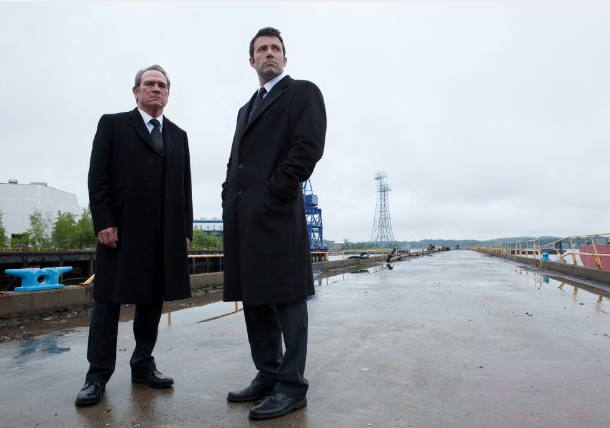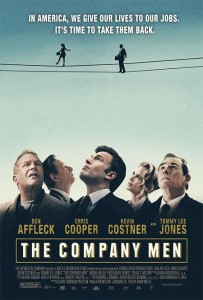
A Great American Screenplay. The Company Men, which is an honestly intelligent as well as pitch-perfect blend of comedy and drama, is about our reckless economy and the expendable employees that fall victim. You wouldn’t think that a film could out-do last year’s “Up in the Air” in regards to this subject matter, but somehow this is more penetrating in how, in detail orientation, it gets into the lives of the laid off. Except that this time it’s about the executives, not the junior staff, that are downsized and how they can’t pay their very high mortgages. Ben Affleck, Tommy Lee Jones, Chris Cooper, Maria Bello and Craig T. Nelson bring their best assets to their parts.
Getting laid-off is not quite yet a wake-up call to Bobby Walker (Ben Affleck, shrewdly using hubris as a defining character trait as he did in “Changing Lanes” or “State of Play”), a sales executive who at first gets pissed off at the board of senior managers and then vows to his family that he will find a replacement job that pulls in six-figures in just a matter of time. He puts on the thousand dollar suit as he hits the job placement agency that is supposed to catapult his comeback. He thinks he will be there a week before lightning strikes. He turns out to be like the others becoming stuck in jobhunt limbo for an indefinite amount of time.
Time to sell off his Porsche and his golf clubs. When you meet his wife Maggie (Rosemarie DeWitt, “Rachel Getting Married”) you might get the impression as I did that she is a super-bitch that demands Bobby to become Mr. Moneybanks again. But she is more attuned to the off-course and humble about losing luxuries than her own husband. To meet many of the house bills, Maggie sells off or cancels membership to a number of items including her son’s X-Box and daddy’s golf club membership. Her brother Jack (Kevin Costner, in the commoner “The Upside of Anger” mode), who kind of hates his arrogant blueblood guts, offers reluctant Bobby a temporary job as a carpenter.
Bobby is still better off than Phil Woodward (Chris Cooper, “Breach”), who is laid-off at 60 and who is not only narrowed of prospects but unsure about how to punch up a resumé which he probably hasn’t typed up in thirty years. He has a scene where he meets up with an acquaintance who is an executive for another company. Phil brushes up, in this faux interview, for a position that requires world travel three-quarters out of a year, saying anything he can to shoehorn himself into that position. The acquaintance insists that it is a young man’s position who can handle the world travel stress, and as an act of salesmanship of his own personal value, Phil insists that he is still young enough.
Other laid-off employees share their stories, but “The Company Men” cannily goes up to the top brass, with Craig T. Nelson (“The Devil’s Advocate”) as the CEO who thinks solely in short-term profits and stock price manipulation and Tommy Lee Jones “No Country for Old Men”) as the senior manager who is in a stage of economic freedom but at a late life crisis of feeling purposeless. The two of them were college buddies, but now subsisting is a hotbed of dispute on how salaries and capital growth should be dispersed. Jones still thinks about the employees, although he laments, “Truth is, I liked five hundred dollar lunches and thousand dollar hotel rooms.” The boiled down decisions of a heartless, self-serving brass have a burning allure. If you have never considered how money is the root of all evil, peek aboard. Maria Bello is called upon to play the axman, and she is also involved in a behind the boardroom affair with one of the corporate men.
When these characters come around in getting in touch with their humility, and come upon realization that their indulgences have to be cut off, their recovery stories become funny and touching in a droll way. The interview scenes of characters on the jobhunt behold a battering fascination. The holiday scenes of characters getting together with extended family are first marked by the deception of “everything is OK” then turned by graciousness of “I’m glad we are all here for each other” dynamic by the following holiday. The writer-director is John Wells in his debut (he is a writer-producer veteran of “ER”), and he has made a masterpiece that resonates with the early 21stcentury.
109 minutes. Rated R.
DRAMA / POLITICS / FALL MOVIE
Film Cousins: “Wall Street” (1987); “Boiler Room” (2000); “Enron: The Smartest Guys in the Room” (2005); “Up in the Air” (2009).





